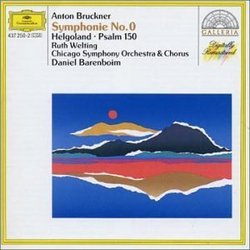| All Artists: Welting, Barenboim, Chicago Symphony Orchestra Title: Bruckner: Symphony in D Minor, Hegoland, 150. Psalm Members Wishing: 0 Total Copies: 0 Label: Universal/Archiv Album Type: Import Genre: Classical Style: Number of Discs: 1 SwapaCD Credits: 1 UPCs: 028943725026, 028943725026 |
Search - Welting, Barenboim, Chicago Symphony Orchestra :: Bruckner: Symphony in D Minor, Hegoland, 150. Psalm
 | Welting, Barenboim, Chicago Symphony Orchestra Bruckner: Symphony in D Minor, Hegoland, 150. Psalm Genre: Classical |
Larger Image |
CD DetailsSimilar CDs
|
CD Reviews"No. 0": the First of Three D-minor Symphonies... Sébastien Melmoth | Hôtel d'Alsace, PARIS | 08/14/2007 (5 out of 5 stars) ".
Since 1977, Bruckner's works are now catalogued with WAB numbers [Werkverzeichnis Anton Bruckner]. Who but Bruckner would have a Symphony No. 0 ? It's very peculiar. And yet, he did not reject this work of 1869: in fact, giving it the designation-numeral "0" includes it in the canon [WAB 100]. It's actually his third symphony, and falls between the official 1st and 2nd. It's an highly original work of art: Brucknerian Robert Simpson calls it a masterpiece saying, "It is scored with beautiful transparency, its sense of movement is perfect, harmonically it is sensitive and original, and its melodic invention is fluent and refined." Moreover, Bruckner's synthesis of Beethoven's Ninth is most notable. Barenboim and the CSO give the work just a little more breathing-room than Chailly and the RSO-Berlin reading of seven years later Bruckner Symphony No. 0 . The song of praise, Psalm CL of 1892 [WAB 38], is a later work. Similar in texture and ethos to the famous Te Deum, it is also more concise with a running time of only :08mins. For full chorus and orchestra, the work features a soprano soloist. Helgoland is a tiny island nearly off the north-western coast of Germany, outside of the harbor of Wilhelmshaven. It had been occupied by Britian since the Napeoleonic wars, but in a gesture of goodwill was ceeded to Germany (1892) at a time when the latter was developing great naval resources on its north coast Dreadnought . The result of which in this case [WAB 71, 1893] is what Oscar Wilde would call "a catastrophe of art"--an unintentiously humorous and jingoistic poem of the Dark Ages by one A. Silberstein wherein the bad Romans are attempting to invade the "Saxon isle"--(talk of convoluted thinking!). Furthermore, it's oddly humorous that a devout Catholic Austrian should take such an interest in the political machinations of Protestant Anglo-Saxons (England & Prussia). Probably the incident was played-up in the newspapers, and Bruckner was caught up in the enthusiasm: the improbable result is Bruckner's 1893 setting for men's chorus and full orchestra, which features thrilling and surging strings and brass with much testosterone: a musico-historical curiosity (:13mins). ." |



